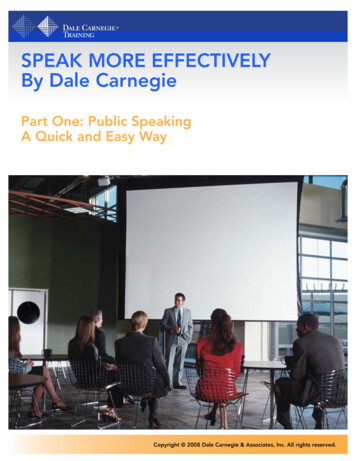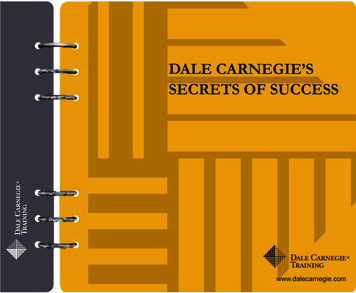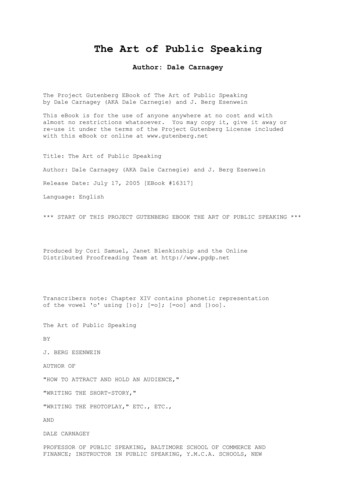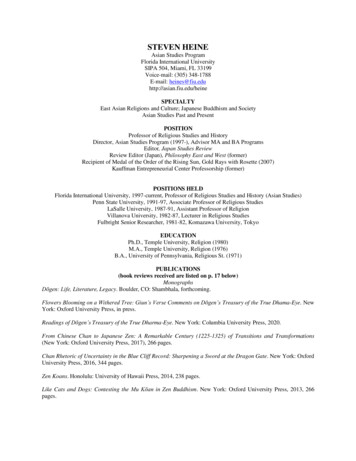
Transcription
SPEAK MORE EFFECTIVELYBy Dale CarnegiePart One: Public SpeakingA Quick and Easy WayBy Dale CarnegieThis booklet reveals the secrets of effective speaking that it took meover 40 years to discover. I have tried to tell you these secrets simply and clearly and to illustrate them vividly. I urge you to carry thisbooklet with you and to read it at least three times next week. Read it;study it; underscore the vital parts.Copyright 2008 Dale Carnegie & Associates, Inc. All rights reserved.1
PART ONE: Public Speaking – A Quick and Easy WayYou may be saying to yourself: “Is there really a quickand easy way to learn to speak in public—or is thatmerely an intriguing title that promises more than itdelivers?”No, I am not exaggerating. I am really going to let youin on a vital secret—a secret that will make it easierfor you to speak in public immediately. Where didI discover this? In some book? No. In some collegecourse in public speaking? No. I never even heard itmentioned there. I had to discover it the hard way—gradually, slowly, painfully.If, back in my college days, someone had given me thispassword to effective speaking and writing,I could have saved myself years and years of wasted,heartbreaking effort. For example, I once wrote a bookabout Lincoln; and while writing it, I threw into thewastebasket at least a year of wasted effort that mighthave been saved had I known the great secrets that Iam going to divulge to you.The same thing happened when I spent two yearstrying to write a novel.It happened again while writing a book on publicspeaking—another year of wasted effort thrown intothe wastebasket because I didn’t know the secrets ofsuccessful writing and speaking.2
IF POSSIBLE, Spend Years in PreparationWhat are these priceless secrets that I have beendangling before your eyes? Just this: talk aboutsomething that you have earned the right to talk aboutthrough long study or experience. Talk aboutsomething that you know and know that you know.Don’t spend ten minutes or ten hours preparing atalk: spend ten weeks or ten months. Better still,spend ten years.Talk about something that has aroused your interest.Talk about something that you have a deep desire tocommunicate to your listeners.To illustrate what I mean, let’s take the case of GayKellogg, a housewife from Roselle, New Jersey. GayKellogg had never made a speech in public beforeshe joined one of our classes in New York. She wasterrified. She feared that public speaking might be anobscure art far beyond her abilities. Yet at the fourthsession of the course, as she made an impromptu talk,she held the audience spellbound. I asked her to speakon “The Biggest Regret of My Life.” Gay Kellogg thenmade a talk that was deeply moving. The listenerscould hardly keep the tears back. I know. I could hardlykeep the tears from welling up in my own eyes. Her talkwent like this:“The biggest regret of my life is that I never knew amother’s love. My mother died when I was only a yearold. I was brought up by a succession of aunts andother relatives who were so absorbed in their ownchildren that they had no time for me. I never stayedwith any of them very long. They were always sorry tosee me come and glad to see me go.They never took any interest in me or gave me anyaffection. I knew I wasn’t wanted. Even as a little childI could feel it. I often cried myself to sleep because ofloneliness. The deepest desire of my heart was to havesomeone ask to see my report card from school. But noone ever did. No one cared. All I craved as a little childwas love—and no one ever gave it to me.”Had Gay Kellogg spent ten years preparing that talk?No. She had spent twenty years. She had beenpreparing herself to make that talk when she criedherself to sleep as a little child. She had been preparingherself to make that talk when her heart ached becauseno one asked to see her report card from school. Nowonder she could talk about that subject. She couldnot have erased those early memories from her mind.Gay Kellogg had rediscovered a storehouse of tragicmemories and feelings away deep down inside her.She didn’t have to pump them up. She didn’t haveto work at making that talk. All she had to do was tolet her pent-up feelings and memories rush up to thesurface like oil from a well.Jesus said: “My yoke is easy, my burden is light.”So is the yoke and burden of good speaking.Ineffective talks are usually the ones that are writtenand memorized and sweated over and made artificial.Good talks are the ones that well up within you as afountain. Many people talk the way I swim. I struggleand fight the water and wear myself out and goone-tenth as fast as the experts. Poor speakers,like poor swimmers, get taut and tense and twistthemselves up into knots—and defeat their ownpurpose.3
Become Excited about Your SubjectEven people with only mediocre speaking ability maymake superb talks if they will speak about somethingthat has deeply stirred them. I saw a striking illustrationof that years ago when I was conducting coursesfor the Brooklyn Chamber of Commerce. It was anexample that I shall remember for a lifetime.It happened like this:We were having a session devoted to impromptu talks.After the class assembled, I asked them to speak on“What, If Anything, Is Wrong with Religion?”One member (a man, by the way, who had neverfinished high school) did something to that audiencethat I have never seen any other speaker do in theyears I have been training people to speak in public.His talk was so moving that when he finished, everyperson in the room stood up in silent tribute.This man told about the greatest tragedy of his life: thedeath of his mother. He was so devastated, sogrief-stricken, that he no longer wanted to live. He saidthat when he went out of doors, even on a sunny day,it seemed as if he were wandering in a fog. He longedto die. In desperation, he went to his church and kneltand wept and said the rosary, and a great peace cameover him—a divine peace of resignation: “Not my will,but Thine be done.”As he finished his talk to the class, he said, in the voiceof one who has had a revelation: “There is nothingwrong with religion! There is nothing wrong with God’slove.”I’ll never forget that talk because of its emotionalimpact. When I congratulated the speaker on hisdeeply moving talk, he replied: “Yes, and I made itwithout any preparation.”Preparation? Well, if he hadn’t prepared that talk, Idon’t know what preparation is. He meant, of course,that he had had no advance notice that he would haveto talk on that subject. I am glad he didn’t, because ifhe had had advance notice, his talk might have beenfar less effective. He might have labored over it andtried to make a speech and been artificial. Instead, hedid just what Gay Kellogg did years later—he stood upand opened his heart and talked like one human beingconversing with another.The truth of the matter is that he was preparing tomake that talk when he knelt and wept and said therosary. Living, feeling, thinking, enduring “the slingsand arrows of outrageous fortune”—that is the finestpreparation ever yet devised for either speaking orwriting.4
LOOK INSIDE YOURSELF for Topics to Talk AboutDo beginners know the necessity of looking insidethemselves for topics? Know it? They never even heardof it! They are more likely to look inside a magazinefor topics. For example, I remember meeting in thesubway one day one of our students—a woman whowas discouraged because she was making so littleprogress in this course. I asked her what she had talkedabout the previous week. I discovered that she hadtalked about whether Mussolini should be permittedto invade Ethiopia. She had gotten her information outof an article in Time. She had read the article twice. Iasked her if she was interested in the subject, and shesaid, “No.” I then asked her why she had talked aboutit. “Well,” she replied. “I had to talk about somethingso I chose that.”Think of it: here was a woman who had tried to speakabout Mussolini’s Ethiopian war, yet she admitted shehad little knowledge and no interest in the subject. Shehad neglected to speak on a subject she had earnedthe right to talk about.After a discussion, I said to her: “I would listen withrespect and interest if you spoke about something youhave experienced and know about, but neither I noranyone else would be interested in a subject whichyou yourself are not interested in, such as Mussolini’sinvasion of Ethiopia. You don’t know enough about it tomerit our attention or respect.”Talk from Your Heart—Not from a BookMany students of public speaking are like that woman.They want to get their subjects out of a book or amagazine instead of from their own knowledge andconvictions. For example, a few years ago, I was oneof the three judges in an intercollegiate speakingcontest over the NBC network. The judges never sawthe speakers. We listened to them from Studio 8G inRadio City. I wish, oh, how I wish that every studentand teacher of public speaking could have witnessedwhat went on in that studio. The first speaker spoke on“Democracy at the Crossroads.” The next one spokeabout “How to Prevent War.” It was painfully evidentthat they were merely repeating carefully rehearsedand memorized words. So neither the guest in thestudio nor the judges paid much attention to them.One of the judges was Willem Hendrik Van Loon.When he began drawing a cartoon of one of thecontestants, everyone stood and watched him andignored the amateurish “orations,” the memorizedwords, which were coming over the air.However, the next speaker caught my attentionimmediately. A senior at Yale, he spoke about whatwas wrong with the colleges. He had earned the rightto talk about that. We listened to him with respect.But the speaker who got the first prize begansomething like this:“I have just come from a hospital where a friend ofmine is near death because of an automobile accident.Most automobile accidents are caused by the youngergeneration. I am a member of that generation andI want to speak to you about the causes of theseaccidents.”Everyone in the studio was quiet as he spoke. He wastalking about realities, not trying to make a speech. Hewas speaking about something that he had earned theright to talk about. He was talking from the inside out.5
Have an Eager Desire to CommunicateHowever, let me warn you that merely earning the rightto talk about a subject will not always produce a superbtalk. Another element must be added—an elementthat is vital in speaking. Briefly, it is this: in addition toearning the right to speak, we must have a deep andabiding desire to communicate our convictions andtransfer our feelings to our listeners.To illustrate: suppose I were asked to talk aboutraising corn and hogs. I spent twenty years on a cornand hog farm in Missouri, so surely I have earnedthe right to talk on that subject. But I don’t have anyspecial desire to talk on that subject. But suppose Iwere asked to speak on what was wrong with the kindof education I got in college. I could hardly fail if Italked on that subject, because I would have the threebasic requirements for a good talk. First, I would betalking about something that I had earned the rightto talk about. Second, I would have deep feelings andconvictions that I longed to convey to you. Third, Iwould have clear and convincing illustrations out of myown experience.When Gay Kellogg spoke on the biggest regret ofher life—never knowing a mother’s love—she had notonly earned the right through suffering to talk on thatsubject, but she also had a deep emotional desire totell us about it. So did the class member who spokein the Brooklyn Chamber of Commerce class aboutthe death of his mother—“Not my will, but Thine bedone.”History has repeatedly been changed by peoplewho had the desire and the ability to transfer theirconvictions and emotions to their listeners. If JohnWesley had not had that desire and ability, he couldnever have founded a religious sect that has girdledthe globe. If Peter the Hermit had not had that desireand ability, he could never have stirred the imaginationof the world and plunged Europe into the futile andbloody Crusades for possession of the Holy Land. IfHitler had not had the innate ability to transfer his hateand bitterness to his listeners, he could not have seizedpower in Germany and plunged the world into war.Talk about Your ExperiencesYou are prepared right now to make at least a dozengood talks—talks that no one else on earth couldmake except you, because no one else has ever hadprecisely the same experience that you have had. Whatare these subjects? I don’t know. But you do. So carrya sheet of paper with you for a few weeks and writedown, as you think of them, all the subjects that you areprepared to talk about through experience—subjectssuch as “The Biggest Regret of My Life,” “My BiggestAmbition,” and “Why I Liked (Disliked) School.” Dothat and you will be surprised how quickly your list oftopics will grow.Here is good news for you: your progress as a speakerwill depend far more on your choosing the right topicto talk about than upon your native ability as a speaker.You can feel at ease and make a fine talk immediatelyif you will only do what Gay Kellogg did: talk aboutsome experience that has affected you deeply, someexperience you have been thinking about for twentyyears. But you may never feel completely at ease if youtry to make speeches about “Mussolini’s Invasion ofEthiopia” or “Democracy at the Crossroads.”6
Talk about Things You Have StudiedTalking about your own experiences is obviously thequickest way to develop courage and self-confidence.But after you have gained a bit of experience, you willwant to talk about other subjects. What subjects? Andwhere can you find them? Everywhere. For example,I once asked a class of executives of the New YorkTelephone Company to jot down every idea for aspeech that occurred to them during the week. It wasNovember. One person saw Thanksgiving Day printedin red on the calendar, and spoke about the manythings for which to be thankful. Another person sawsome pigeons on the street. That inspired an idea. Theperson gave a talk about pigeons that I shall neverforget. But the prize winner that night was a classmember who had seen a bedbug crawling up a man’scollar in the subway. The class member gave us a talkthat I still remember after twenty years.Carry a Scribbling BookWhy don’t you do what Voltaire did? Voltaire, one ofthe most powerful writers of the eighteenth century,carried in his pocket what he called a “scribblingbook”—a book in which he jotted down his fleetingthoughts and ideas. Why don’t you carry a “scribblingbook?” Then, if you are irritated by a discourteousclerk, for example, jot down the word “Discourtesy” inyour scribbling book.Then try to recall two or three other striking incidentsof discourtesy. Select the best one and tell us what weought to do about it. Presto! You have a two-minutetalk on Discourtesy.As soon as you begin to look for topics for talks, youwill find them everywhere: in the home, the office, thestreet.“Sing Something Simple”Don’t attempt to speak on some worldshakingproblem such as “The Atomic Bomb.” Take somethingsimple—almost anything will do, provided theidea gets you, instead of your getting the idea. Forexample, I recently heard a student of this course,Mary A. Leer, of Chicago, talk on “Back Doors.” Youmay find her talk dull as you read it; but if you had onlylistened to it, as I did, you would have loved it becauseshe herself was positively excited about her back door.In fact, I never before heard anyone speak with suchglowing enthusiasm about painting the back door! Thepoint I am trying to make is this: almost any subjectwill do for a talk provided you yourself have earned theright to talk about it through study or experience, andare excited about it and eager to tell us about it.7
This Is the Famous Talk about Back Doors!“Four years ago, when I moved into my presentapartment, the back door was painted a drab shadeof gray. It was terrible. Every time I opened the backdoor it gave me a depressed feeling. So I bought a canof beautiful blue paint and painted the outside of theback door, the jambs and the inside of the screen door.That paint was the most exquisite shade of blue that Ihad ever seen; and every time I opened the back doorafter that, it seemed as though I was looking upon a bitof heaven.back doors tell tales. A slovenly back door tattles onslovenly housekeeping. But a back door that is painteda cheerful color and has pots of blooming plantssitting around and garbage cans that are painted andorderly, that kind of back door tells you that there isan interesting person with a lively imagination livingbehind it. I have already bought a can of beautifulblue paint; and next Saturday, I am going to have agorgeous time. I am again going to make my backdoor cheerful and inspiring.”“I was never more angry in my life than when I camehome one evening not long ago and found that thehouse painter had pried open my screen door andpainted my beautiful blue door a most hideous shadeof putty gray. I could have cheerfully choked thatpainter.And so it goes. A volume could be filled withexamples to show the power of speakers who:(a) Have earned the right, by study andexperience, to talk about their subject;(b) Are excited about it themselves; and“You can tell a lot more about people from theirback doors than you can from their front doors. Frontdoors are often prettied up just to impress you. But(c) Are eager to communicate their ideas andfeelings to their listeners.8
HOW TO PREPARE AND DELIVER YOUR TALKSHere are eight principles that will helpimmensely in preparing your talks:I.Make brief notes of the interesting thingsyou want to mention.II.Don’t write out your talks.Why? Because if you do, you will use written languageinstead of easy, conversational language; and when youstand up to talk, you will probably find yourself trying toremember what you wrote. That will keep you fromspeaking naturally and with sparkle.III. Never, never, never memorize a talk wordfor word.If you memorize your talk, you are almost sure to forget it;and the audience will probably be glad, for nobody wantsto listen to a canned speech. Even if you don’t forgetit, it will sound memorized. You will have a faraway lookin your eyes and a faraway ring in your voice. You won’tsound like a human being trying to tell us something.If, in a longer talk, you are afraid you will forget whatyou want to say, then make some brief notes and holdthem in your hand and glance at them occasionally.That is what I usually do.IV. Fill your talk with illustrations and examples.By far the easiest way to make a talk interesting is tofill it with examples. To illustrate what I mean, let’stake this booklet you are reading now. Approximatelyhalf of those pages are devoted to illustration. First,there is the illustration of Gay Kellogg’s talk about thesuffering she endured as a child. Next, the illustrationof the speaker on “What, If Anything, Is Wrong withReligion?” Next, the example of the woman whotried to talk on Mussolini’s invasion of Ethiopia. Thatis followed by the story of the four college studentsin a speaking contest over the radio—and so on. Mybiggest problem in writing a book or preparing aspeech is not to get ideas, but to get illustrations tomake those ideas clear, vivid, and unforgettable. Theold Roman philosophers used to say, “Exemplumdocet” (the example teaches). And how right theywere!For example, let me show you the value of anillustration. Years ago, a congressman made a stormyspeech accusing the government of wasting our moneyby printing useless pamphlets. He illustrated whathe meant by saying the government had printed apamphlet on “The Love Life of the Bullfrog.” I wouldhave forgotten that speech years ago if it hadn’tbeen for that one specific illustration, “The Love Lifeof the Bullfrog.” I may forget a million other facts asthe decades pass, but I’ll never forget his charge thatthe government wastes our money by printing andgiving away pamphlets such as “The Love Life of theBullfrog!”Exemplum docet. Not only does the example teach,but it is about the only thing that does teach. I haveheard brilliant speeches which I promptly forgotbecause there were no examples to make them stick inmy memory.V.Know far more about your subject that youcan use.Ida Tarbell, one of America’s most distinguished writers,told me that years ago, while in London, she receiveda cable from S.S. McClure, the founder of McClure’sMagazine, asking her to write a two-page articleon the Atlantic Cable. Miss Tarbell interviewed theLondon manager of the Atlantic Cable and got all theinformation necessary to write her five-hundred wordarticle. But she didn’t stop there. She went to the BritishMuseum library and read magazine articles and booksabout the Atlantic Cable, and the biography of CyrusWest Field, the man who laid the Atlantic Cable. Shestudied cross sections of cables on display in the BritishMuseum, and then visited a factory on the outskirts ofLondon and saw cables being manufactured. “WhenI finally wrote those two typewritten pages on theAtlantic Cable,” Miss Tarbell said, as she told me thestory, “I had enough material to write a small bookabout it. But that vast amount of material which I hadand did not use enabled me to write what I did writewith confidence and clarity and interest. It gave mereserve power.”9
Ida Tarbell had learned through years of experiencethat she had to earn the right to write over fivehundred words about the Atlantic Cable. The sameprinciple goes for speaking. Make yourself somethingof an authority on your subject. Develop that pricelessasset known as reserve power.VI. Rehearse your talk by conversing with yourfriends.trying to catch a mouse. It doesn’t look around andsay: “I wonder how my tail looks, and I wonder if I amstanding right, and how is my facial expression?” Oh,no. That cat is so intent on catching a mouse for dinnerthat it couldn’t stand wrong or look wrong if it tried—and neither can you if you are so vitally interested inyour audience and in what you are saying that youforget yourself.VII. Instead of worrying about your delivery,find ways of improving it.Don’t imagine that expressing your ideas and emotionsbefore an audience is something that requires yearsof technical training such as you have to devote tomastering music or painting. Anybody can make asplendid talk at home when angry. For example, ifsomebody hauled off and knocked you down thisinstant, you would get up and make a superb talk. Yourgestures, your posture, your facial expression wouldbe perfect because they would be the expressionsof genuine anger. And remember, you don’t have tolearn to express your emotions. You could express youremotions superbly when you were six months old. Askany mother.Much harmful, misleading nonsense has beenwritten about delivery of a speech. The truth is thatwhen you face an audience, you should forget allabout voice, breathing, gestures, posture, emphasis.Forget everything except what you are saying. Whatlisteners want, as Hamlet’s mother said, is “morematter, with less art.” Do what a cat does whenWatch a group of children at play. What fineexpression! What perfect emphasis, gestures, posture,communication! Jesus said: “Except ye becomeas little children, ye cannot enter the kingdom ofheaven.” Yes, and unless you become as natural andspontaneous and free as little children at play, youcannot enter the realm of good expression.Will Rogers prepared his famous Sunday night radiotalks by trying them out as conversation on the peoplehe met during the week. If, for example, he wanted tospeak on the gold standard, he would wisecrack aboutit in conversation during the week. He would thendiscover which of his jokes went over, which remarkselicited people’s interest. That is an infinitely betterway to rehearse a talk than to try it out with gestures infront of a mirror.10
If Your Attitude Is Good—Your Talk Will BeYour problem isn’t to try to learn how to speak withemphasis, or how to gesture or how to stand. Thoseare merely effects. Your problem is to deal with thecause that produces those effects. That cause is deepdown inside you; it is your own mental and emotionalattitude. If you get yourself in the right mental andemotional condition, you will speak superbly. Youwon’t have to make any effort to do it. You will do it asnaturally as you breathe.To illustrate, a rear admiral of the United States Navyonce took this course. He had commanded a squadronof the United States Fleet during World War I. Hewasn’t afraid to fight a naval battle, but he was so afraidto face an audience that he made weekly trips from hishome in New Haven, Connecticut, to New York City toattend this course.Half a dozen sessions went by, and he was stillterrified. So one of our instructors, Professor ElmerNyberg, had an idea that might make the admiralcome out of his shell. There was a radical in this class.Professor Nyberg took him to one side and said: “Iwonder if you will be good enough to make a strongtalk to support your philosophy of government?Obviously, you will make the admiral angry, which isexactly what I want. He will forget himself and in hiseagerness to refute your position, he probably willmake a good talk.” The radical said,“Sure, I’ll be gladto.” He had not gone far in this talk, when the rearadmiral leaped to his feet and shouted: “Stop! Stop!That’s sedition!” Then he gave a fiery talk on how mucheach of us owes to our country and its freedom.Professor Nyberg turned to the naval officer and said,“Congratulations, Admiral! A magnificent talk!” Therear admiral snapped back: “I’m not making a talk, butI am telling that little whippersnapper a thing or two.”Then Professor Nyberg explained that it had all been aput-up job to get the admiral out of his shell, and makehim forget himself.This rear admiral discovered just what you will discoverwhen you get stirred up about a cause bigger thanyourself. You will discover that all fears of speaking willvanish and that you don’t have to give a thought todelivery, since the causes that produce good deliveryare working for you irresistibly.Let me repeat: Your delivery is merely the effect ofa cause that preceded and produced it. So if youdon’t like your delivery, don’t muddle around tryingto change it. Get back to fundamentals and changethe causes that produced it. Change your mental andemotional attitude.VIII. Don’t imitate others; be yourself.I first came to New York to study at the AmericanAcademy of Dramatic Arts. I aspired to be an actor.I had what I thought was a brilliant idea, a shortcut tosuccess. My campaign to achieve excellence was sosimple, so foolproof, that I was unable to comprehendwhy thousands of ambitious people hadn’t alreadydiscovered it. It was this: I would study the famousactors of that day—John Drew, E. H. Sothern, WalterHampden and Otis Skinner. Then I would imitate thebest points of each one of them and make myselfinto a shining, triumphant combination of all of them.How silly! How tragic! I had to waste years of my lifeimitating other people before it penetrated my thickMissouri skull that I had to be myself, and that I couldn’tpossibly be anyone else.To illustrate what I mean: A number of years ago,I set out to write the best book on public speakingfor business people that had ever been written. I hadthe same foolish idea about writing this book that Ihad formerly had about acting: I was going to borrowthe ideas of many other writers and put them all inone book—a book that would have everything. So Igot scores of books on public speaking and spent ayear incorporating their ideas in my manuscript. But itfinally dawned on me once again that I was playing thefool. This hodgepodge of other people’s ideas that Ihad written was so synthetic, so dull that no businesspeople would ever stumble through it. So I tossed ayear’s work into the wastebasket, and started all overagain. This time I said to myself: “You’ve got to beDale Carnegie, with all his faults and limitations. Youcan’t possibly be anybody else.” So I quit trying to be acombination of other people, and rolled up my sleevesand did what I should have done in the first place:I wrote a textbook on public speaking out of my ownexperiences and observations and convictions.Why don’t you profit by my stupid waste of time? Don’ttry to imitate others.11
Don’t Be Afraid of Being YourselfBe yourself. Act on the sage advice that Irving Berlingave to the late George Gershwin. When Berlin andGershwin first met, Berlin was famous—but Gershwinwas a struggling young composer working for thirtyfive dollars a week in Tin Pan Alley. Berlin, impressedby Gershwin’s ability, offered Gershwin a job as hismusical secretary at almost three times the salary hewas then getting. “But don’t take the job,” Berlinadvised. “If you do, you may develop into a secondrate Berlin. But if you insist on being yourself, someday you’ll become a first-rate Gershwin.” Gershwinheeded that warning and slowly transformed himselfinto one of the significant American composers of hisgeneration.In the last analysis, all art is autobiographical. You cansing only what you are. You can paint only what youare. You can write only what you are. You can speakonly what you are. You must be what your experiences,your environment, and your heredity have made you.For better or for worse, you must cultivate your owngarden. For better or for worse, you must play yourown instrument in life’s orchestra. As Emerson said inhis essay, “Self-reliance”:There is a time in every man’s education when hearrives at the conviction that envy is ignorance;that imitation is suicide; that he must take himselffor better, for worse, as his portion; that althoughthe wide universe is full of good, no kernel ofnourishing corn can come to him but throughhis toil on that plot of ground which is given him
By Dale Carnegie By Dale Carnegie This booklet reveals the secrets of effective speaking that it took me over 40 years to discover. I have tried to tell you these secrets sim-ply and clearly and to illustrate them vividly. I urge you to carry this booklet with you and to read it at least three times next week. Read it;










